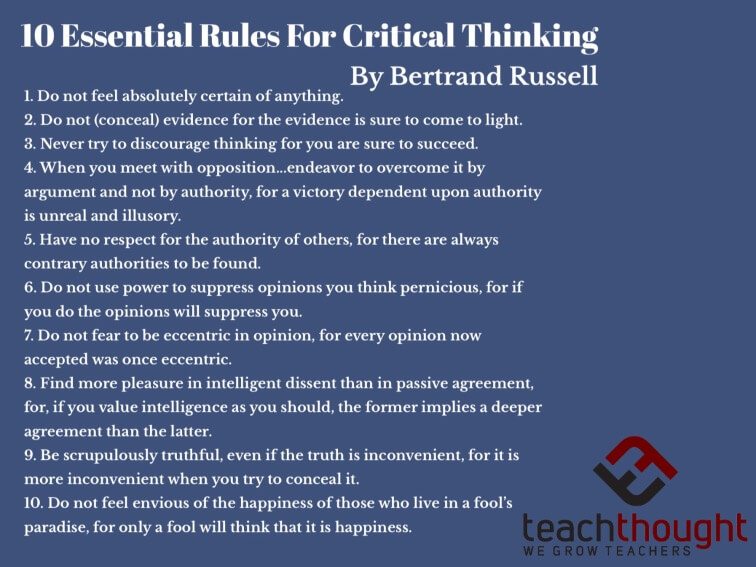
Bertrand Russell’s 10 Essential Rules Of Critical Thinking
by Terry Heick
For a field of study that explores the nature of knowledge, Philosophy has had a surprisingly small impact on education.
Most formal academic ‘platforms’ like public schools and universities tend to parse knowledge into content areas–what is being learned–rather than how and why it is being learned. This, to a degree, reduces the function of pure philosophy. Psychology, Neurology, and even Anthropology all have had a louder voice in ‘education,’ which may explain why critical thinking seems to be so often missing from most school and curriculum design.
There are exceptions, of course. John Dewey is one of the central figures in modern Western education. British philosopher Bertrand Russell, too, was interested in how people think and learn, and for a 1951 piece in New York Times Magazine created a convenient itemized list we might follow as a kind of set of ‘rules’ for for critical thinking (he called them ‘commandments’–long story).
See also 25 Critical Thinking Apps For Extended Student Learning
Bertrand Russell’s 10 Essential Rules Of Critical Thinking
Perhaps the essence of the Liberal outlook could be summed up in a new decalogue, not intended to replace the old one but only to supplement it. The Ten Commandments that, as a teacher, I should wish to promulgate, might be set forth as follows:
- Do not feel absolutely certain of anything.
- Do not think it worthwhile to proceed by concealing evidence, for the evidence is sure to come to light.
- Never try to discourage thinking for you are sure to succeed.
- When you meet with opposition, even if it should be from your husband or your children, endeavor to overcome it
- by argument and not by authority, for a victory dependent upon authority is unreal and illusory.
- Have no respect for the authority of others, for there are always contrary authorities to be found.
- Do not use power to suppress opinions you think pernicious, for if you do the opinions will suppress you.
- Do not fear to be eccentric in opinion, for every opinion now accepted was once eccentric.
- Find more pleasure in intelligent dissent than in passive agreement, for, if you value intelligence as you should, the
- former implies a deeper agreement than the latter.
- Be scrupulously truthful, even if the truth is inconvenient, for it is more inconvenient when you try to conceal it.
- Do not feel envious of the happiness of those who live in a fool’s paradise, for only a fool will think that it is happiness.
Bertrand Russell’s 10 Essential Rules Of Critical Thinking